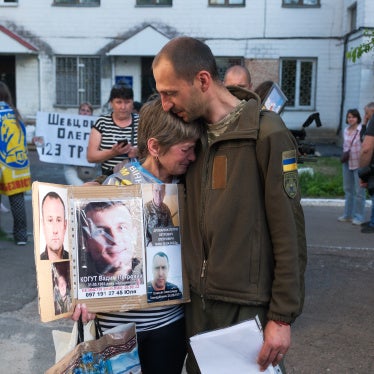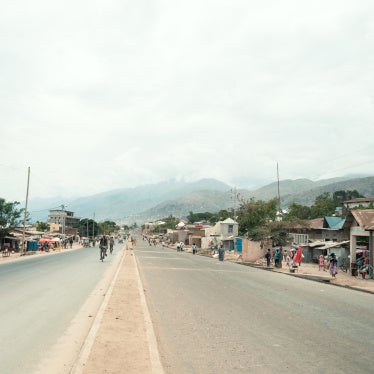(New York) - Leaders of the separatist insurgency in southern Thailand must end the targeting of civilians in their effort to establish an independent state, Human Rights Watch said today.
“Insurgent groups continue to unleash brutality on civilians to demonstrate their power and weaken the credibility of Thai authorities,” said Brad Adams, director of the Asia division at Human Rights Watch. “Retaliating against government abuses does not provide any excuse for killing civilians. Their tactics are illegal and cannot be justified in any circumstances.”
On July 4, insurgents beheaded Khan Sangthong, a 55-year-old Buddhist, in Bannang Sta district, Yala province. He was shot, burned, had nails hammered through his hands, and was beheaded. His severed head was placed on a bridge about 60 meters from his body. Over the past four years, more than 20 Buddhist Thais have been beheaded by insurgents across the southern border provinces.
Thai officials told Human Rights Watch that Khan was the latest victim in a series of deadly attacks on government officials and civilians in Bannag Sta district, which have been carried out in apparent reprisal for the recent killing in a firefight of local insurgent leader Koseng Apibanbae and five other members of his cell by government security forces on June 23.
Similar retaliatory attacks took place in Yala’s Raman district after Abdulloh Da-esor, younger brother of local insurgent leader Abdulroning Da-esor, was killed with other two insurgents in a gunfight with government security forces on March 28. Since then, insurgents have reacted by attacking civilians. On July 2, Veera Muenjan, the 54-year-old principal of Ban Ma Hae School, was shot dead by insurgents. This attack forced all 55 government schools in Raman district to close. Veera was the 99th victim of deadly assaults on government teachers since the outbreak of insurgent violence in January 2004. On July 5, three Muslims – who allegedly worked as informants for the army – were killed and three others were wounded when insurgents opened fire at a crowded teashop not far from where Veera was murdered.
Insurgents have killed and injured civilians in Narathiwat province in apparent retaliation for the death of a Muslim religious leader, Yapa Kaseng, who was tortured to death on March 21 while being detained and interrogated by soldiers from the Army’s 39th Taskforce in Rue Soh district (see https://www.hrw.org/english/docs/2008/03/26/thaila18346.htm; and https://www.hrw.org/english/docs/2008/07/03/thaila19251.htm). For example, on July 2, Wanna Sisuan, a 27-year-old Buddhist woman, was shot in the head by insurgents in Rue Soh district after dropping her children at school. A leaflet was left next to her body saying: “Soldiers killed Malayu [ethnic Malay] people. So, we will kill Thai people.” On June 21, heavily armed insurgents stormed a passenger train in Ra Ngae district and executed a Buddhist train police officer and three Buddhist train workers. Train services to the southern border provinces were suspended for six days after the attack.
“Leaders of the insurgency need to rethink their tactics, which are not only abhorrent, but also are alienating large sections of public opinion in the south, including in their own community,” said Adams.
Human Rights Watch has repeatedly condemned violations of the laws of war by government forces and insurgents in southern Thailand. A fundamental principle of the laws of war is the distinction between civilians and military objectives. The insurgents claim that the civilians attacked were part of a larger group (Buddhist Thais) that is participating in the hostilities, but the laws of war allow no such defense or justification for attacks on civilians. Radical interpretations of Islamic law that would permit attacks on civilians in certain circumstances are also contrary to the laws of war. International humanitarian law explicitly prohibits insurgent tactics such as reprisal attacks against civilians and captured combatants, summary execution of civilians or captured combatants, mutilation or other mistreatment of the dead, and attacks directed at civilian facilities.
Although the Pejuang Kemerdekaan Patani (Patani Freedom Fighters), separatist insurgents in the loose network of BRN-Coordinate (National Revolution Front-Coordinate), have suffered major setbacks from security sweeps, they still maintain their presence in hundreds of Muslim villages. They use state-sponsored abuses and heavy-handed tactics to justify their campaign of violence and terror. According to Thai Journalists Association, there have been 526 attacks in Yala, Pattani, and Narathiwat provinces and four districts of Songkhla province in the first six months of 2008, resulting in 301 deaths.
“Neither side in this devastating conflict pays enough attention to protecting the lives and rights of the local residents,” Adams said. “People in the south are trapped between violently abusive insurgents and government forces.”






